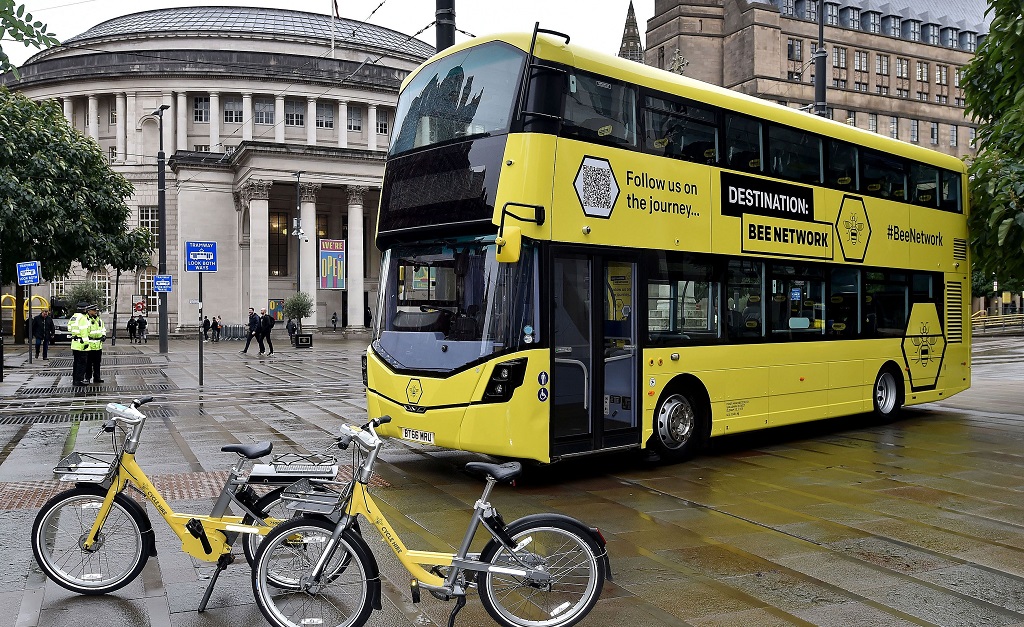Greater Manchester regains control of buses after 40 years
The city region has become the first place in England to take back jurisdiction of its public transport following a period of deregulation with the launch of its Bee Network yesterday.
Greater Manchester has regained control of its buses through the locally controlled service, 40 years after the abolition of road service licensing outside of Greater London. This abolition removed the public sector’s role in fare-setting, routes, and bus frequencies.
The Bee Network has overturned this move to introduce a London-style public transport system in Greater Manchester. Changes include earlier, later, and more frequent bus services with a single brand identity running throughout.
The service is being delivered in three phases, initially operating in Bolton, Wigan, and parts of Salford and Bury. A total of 50 new electric buses are now in service in these areas, with several hundred more to be delivered over the next few years.
Bus services in Rochdale, Oldham, Bury, parts of Manchester, Salford, and Tameside are set to follow and come under local control from 24 March. This will be extended to the rest of the city region from January 2025.
Mayor of Greater Manchester Andy Burnham described the launch of the Bee Network as a “coming of age moment for devolution”.
“For nearly 40 years we have seen worsening services and plummeting passenger numbers on our buses”, he stated.
“We’ve had to reckon with a deregulated bus network that cuts vital services that connect communities to jobs, hospitals, and opportunities on a whim – leaving local leaders with limited budgets to pick up the tab to keep these routes alive.
“With the launch of the Bee Network, Greater Manchester is blazing a trail for other city regions who are ready to follow our lead in reversing the failed bus deregulation experiment and creating an integrated transport network that is run in the interests of, and accountable to, our communities”.
The combined authority was given the green light to franchise its buses following a judicial review last March. Bus firms Stagecoach and Rotala had put the brakes on the plan, sparking the review by claiming that the franchise system was unlawful.
Transformed bus services are part of a wider plan for a more accessible and integrated network to bring together buses, trams, and ultimately rail services by the end of the decade.
Transport commissioner for Greater Manchester, Vernon Everitt, said: “The return of locally controlled bus services provides the platform for the transformation of public transport and active travel in the region.
“It’s the path to safe, reliable, and affordable transport for everyone, growing in a sustainable way Greater Manchester’s economy and productivity and access to new jobs, homes, and opportunity.”
Enabling people to walk and cycle is another key part of the Bee Network. Greater Manchester hopes to connect every area and community with 1,800 miles of safe routes and 2,400 new crossings and work is already underway. Since 2019, more than 50km of high-quality walking and cycling routes have been built across the 10 boroughs, with a further 50km due to be delivered by the end of 2024.
Active travel commissioner, Dame Sarah Storey, said: “Public transport can only be successful if it is properly integrated with walking, wheeling and cycling infrastructure that enables people to move with ease”.





Local authorities can’t even fill in our hole on time and without great expense- now they expect to run an entire bus network – good luck with that
By Stuart wood
Stuart Wood, the buses in Edinburgh are run by the local authority and I understand it wins awards for punctuality and cleanliness. It needs to be recognised that privatisation of public transport has been an abject failure, the UK railways should also be returned to public ownership.
By Monty
@Stuart Wood, the fact you think local authorities would be running the bus network shows how out of touch so many people seem to be. TfGM will be managing the bus network, not the LGA, an organisation that has excellent experience with public transport considering their Metrolink network has been running a lot more efficiently than buses. Just looking at how poorly the buses have been run over the last few decades, more than halving the number of passengers both while the city region has grown significantly in population and whilst TfL down south has managed to double passengers in the same amount of time.
TfGM on the other hand have turned Metrolink into the most successful urban rail network outside of London and that’s despite the fact it’s pretty much just a tram network and not even a proper metro
By EOD
I don’t want my hole filled in by the local authority, I’d rather they spend the money on a great transport service. This is a good thing.
By Anonymous
Local authorities have made a much better fist of commissioning and running bus services than a private sector free-for-all as evidenced by the ridership levels in London where this system already exists compared to consistent decline and escalating costs outside London. That’s why we are seeing this system introduced in Manchester in the teeth of opposition from the bus companies. Privatisation has failed here as and failed big time, in much the same way as it has failed in the delivery of so many other forms of infrastructure, utilities and public services.
By Anonymous
This can only be a good thing. Time for rail next and an underground met system in the city centre.
By Anonymous